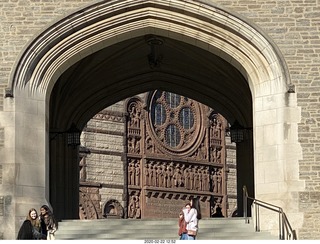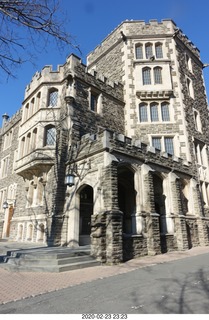|
Dear Princetonians,
With deep regret and sadness, I write to update you about our plans
for the fall, and, in particular, to explain why Princeton has
decided that its undergraduate program must be fully remote in
the coming semester. In brief, the pandemic’s impact in New
Jersey has led us to conclude that we cannot provide a genuinely
meaningful on-campus experience for our undergraduate students
this fall in a manner that is respectful of public health
concerns and consistent with state regulations and guidance.
When I last communicated with you, just over a month ago, we
anticipated welcoming undergraduates from the Classes of 2022 and
2024 to campus in late August. We noted at the time, however,
that we would continue to monitor the course of the pandemic, and
that we might have to change our plans if it worsened. In the
weeks that followed, infection rates soared around much of the
country, with nearly 2 million new cases reported over the last
month. This development had two serious adverse consequences for
Princeton’s ability to provide undergraduates with a
positive and safe on-campus experience in the fall.
First, the health risks to the campus and surrounding populations
appear greater now than they did just a month ago. Reopening
efforts in New Jersey and elsewhere have demonstrated how
difficult it is to contain the disease. Where schools and
universities have started to bring back students, COVID cases
have rapidly followed.
People throughout this University have done outstanding work to
prepare the campus to receive students safely, but the risk of
widespread contagion and serious illness remains. Moreover,
even if we successfully controlled on-campus spread of the
disease, transmission rates might rise statewide or in our
region. We might then have to send undergraduate students home
again or impose exceptionally severe restrictions on their
mobility and interaction with one another.
Second, the persistent spread of COVID-19 compelled New Jersey to
preserve and augment restrictions that it expected to ease.
New Jersey, like most states, has instituted a phased approach
to managing public activities during the pandemic. In early
July, New Jersey had reached stage 2 of its reopening plan,
and officials were optimistic that we could soon move to stage
3. The state, however, had to pause its plan to avoid the
spikes of infection that occurred in other states as they
reopened.
Instead of loosening regulations, New Jersey justifiably imposed some
new ones. For example, over the past month New Jersey has
roughly tripled (from 12 to 34) the number of states whose
residents must quarantine for 14 days after arriving in New
Jersey. We believe that Governor Philip Murphy and his
administration have skillfully and responsibly managed the
extraordinary challenges of COVID-19 and the risks it poses to
New Jersey, and we appreciate their attention both to the
pandemic and to the complex needs of the higher education
sector.
New Jersey’s careful approach has helped to keep the pandemic in
check, but public health principles and state guidance still limit
very substantially what we can do on campus. For example, they
prevent or severely constrain our ability to provide several key
elements of residential life, including indoor dining, student
gatherings, and access to indoor common spaces and gyms. Colleges
and universities have not yet received general authorization to
teach in-person classes. Moreover, many out-of-state students now
face strict quarantine requirements upon their arrival in New
Jersey.
This combination of health concerns and restrictions will
significantly diminish the educational value of the on-campus
experience. It will also render that experience confining and
unpleasant for most students.
In light of the diminished benefits and increased risks currently
associated with residential education amid New Jersey’s
battle against the pandemic, we have decided that our undergraduate
program should be fully remote in the fall semester of 2020. We
will continue to accommodate on campus those students whose
situations make it extremely difficult or impossible for them to
return to or study from home. We will also accommodate a very
limited number of students with previously approved exceptions
recognizing their need to be on campus for specific aspects of
their senior thesis research or other work essential to their
degree programs.
We continue to hope that we will be able to welcome undergraduate
students back to campus in the spring. If we are able to do so, our
highest priority will be to bring back seniors in the Class of
2021. We hope we will also be able to bring back additional
students. We cannot, however, make any guarantees. We will
communicate with you about the spring semester in the weeks and
months ahead. Please know that we are doing everything we can to
make possible a residential semester in the spring.
In the meantime, we remain committed to offering the best possible
undergraduate education consistent with the difficult conditions
imposed by the COVID pandemic. Princeton’s faculty and staff
across campus have been working for months to develop new and
engaging online offerings, knowing that much of our program would
have to be virtual even if some of our students were on campus.
Though we wish we could restore a residential component to our
teaching program, we will now focus even more intensely on making
the virtual academic and co-curricular programs as strong as they
can be.
Because of their different instructional and residential programs, it
will still be possible for Princeton’s graduate
students, including incoming first-year graduate students, to
be on campus for the upcoming semester. Most programs are also
able to offer remote options for incoming first-year graduate
students for the fall term as needed. The Graduate School will
continue to provide information about this topic.
We appreciate that you undoubtedly have many questions not answered by
this letter. We have updated our
https://fall2020.princeton.edu/
FAQs for all students, parents, and other members of the community ,
and we will continue to do so in the days ahead.
I understand, as do my colleagues, that the news contained in this
letter will be disheartening and disappointing. We know that our
students very much wanted to be back on this campus. We very much
wanted to have you here: you are the life of this place, and we
miss you tremendously.
We will continue to do everything we can to welcome students back as
soon as possible to a campus experience that is both safe and
meaningful. We look forward to that day, and until then we will
work together with all of you to sustain this special community in
the face of the unprecedented challenges we’re confronting
together.
With very best wishes,
Christopher L. Eisgruber
|  The premise of having universities in general,
and Princeton University in particular,
is that the classroom and dormitory experiences
are an important part of growing up for smart people,
that it makes them better and more-useful people.
I happen to agree and I feel it was important for me.
The classroom interaction with occasionally-brilliant professors
and often-smart classmates
and the social interaction with the same community
was a joy to me.
The premise of having universities in general,
and Princeton University in particular,
is that the classroom and dormitory experiences
are an important part of growing up for smart people,
that it makes them better and more-useful people.
I happen to agree and I feel it was important for me.
The classroom interaction with occasionally-brilliant professors
and often-smart classmates
and the social interaction with the same community
was a joy to me.
